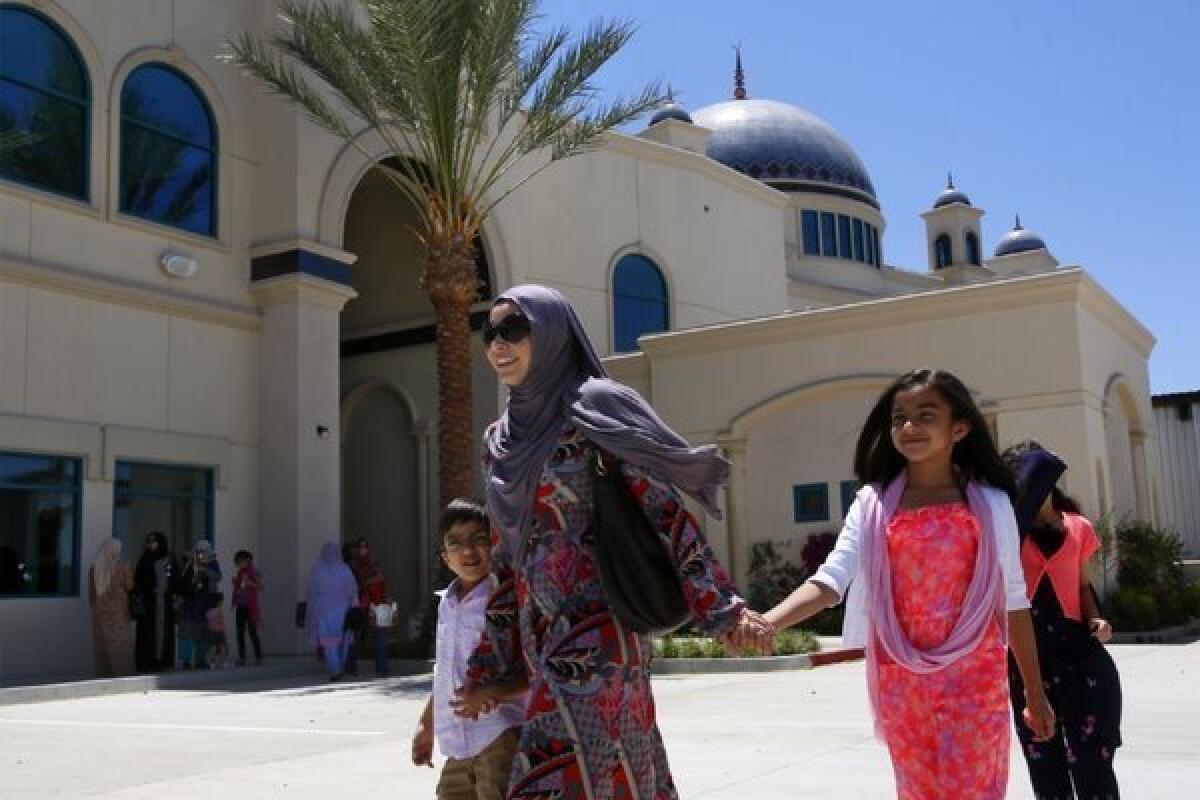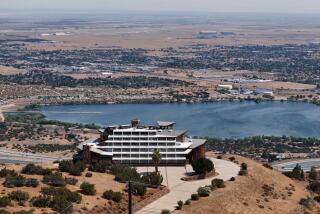Islamic Center of San Gabriel Valley opens new mosque

- Share via
After four years of construction and $5.5 million in fundraising, the Islamic Center of San Gabriel Valley formally opened its soaring new mosque Saturday.
For Muslim worshippers, the transformation of their prayer space from a dilapidated church next to a smelly chicken farm purchased three decades ago to a 45,000-square-foot structure complete with a school, mortuary, health clinic and three libraries marks a coming of age for their community.
It’s also powerful evidence of a building boom of new mosques in both Southern California and the nation.
Over the last several years, new mosques have risen in Mission Viejo, Irvine, Anaheim, Reseda, Rancho Cucamonga, Rosemead, Diamond Bar and Tustin. Additional mosques are slated in Temecula, Ontario, Lomita and Corona.
Strikingly, all of the new mosques have been funded entirely by local Muslims, who began settling in the region in the 1960s. Before 2001, new mosques were often funded by foreigners; Saudi Arabians financed the King Fahad Mosque in Culver City, and Libyans helped build Masjid Omar near USC.
Stricter government scrutiny of foreign investments from Islamic countries following the Sept. 11 terrorist attacks, along with reluctance by local Muslims about accepting foreign money, helped change the practices, according to Shakeel Syed, executive director of the Islamic Shura Council of Southern California.
“Post 9/11, the dynamic completely changed,” Syed said. “The Muslim community at large in North America realized it is better if we develop our own funding, however long it takes.”
Syed said many Muslims have built up successful businesses over the last few decades and are now positioned to give back. Some did relatively well during the recession, as they were able to buy undervalued properties while not taking on risky investments or interest-incurring debt, which is barred in Islam, he said.
Among metropolitan areas, Southern California is home to 120 mosques, second only to the New York area, the study found. (Estimates of the Muslim-American population vary, but a 2011 Pew Research Center study placed it at about 2.7 million nationwide and growing.)
At the new Masjid Qubaa in Rowland Heights, several members donated $100,000 and a few gave $500,000. The women held a fashion show, which raised $100,000. Dozens of skilled craftsmen contributed services and construction materials, which significantly reduced the structure’s cost.
Syed Rizvi, the center’s president, reflects the arc of success experienced by some of the community’s more affluent members. He arrived in the United States from Pakistan in 1975 with a single suitcase and $7,500. But he came armed with a professional medical degree and he eventually opened several kidney dialysis centers. He donated a six-figure sum to the project, said Yasmeen Khan, a mosque leader.
“We were professionals, but we were not rich,” Rizvi said. “America gave that opportunity for us all.”
A couple from Orange County gave the mosque an interest-free loan from their pension. And, Syed said, the Islamic Center of Corona gave the Rowland Heights group a bridge loan — a common practice among Southern California mosques, which share their resources.
ALSO:
Body found in trash can in Brea
Fatal stabbing is reminder of Hollywood’s darker past
Audits are critical of agency managing LAX modernization project
More to Read
Sign up for Essential California
The most important California stories and recommendations in your inbox every morning.
You may occasionally receive promotional content from the Los Angeles Times.












